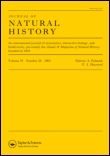
JOURNAL OF NATURAL HISTORY
metrics 2024
Fostering Innovation in Ecological Research
Introduction
The Journal of Natural History, established in 1967, is a pivotal academic resource published by Taylor & Francis Ltd. With an ISSN of 0022-2933 and an E-ISSN of 1464-5262, this journal is a cornerstone in the field of Ecology, Evolution, Behavior, and Systematics. Ranked Q2 in its category as of 2023, it stands out with a Scopus ranking of #477 out of 721, reflecting its influence and relevance, particularly in the agricultural and biological sciences. The Journal of Natural History aims to disseminate high-quality, peer-reviewed research that contributes to our understanding of biodiversity and ecosystem dynamics. Although it does not operate under an open-access model, this journal remains accessible through various academic libraries and platforms, making it an essential resource for researchers, professionals, and students striving to advance their knowledge in natural history. With its long-standing commitment to excellence, the journal plays a crucial role in shaping discourse and fostering innovation in ecological research.
Metrics 2024
 0.43
0.43 0.80
0.80 0.90
0.90 54
54Metrics History
Rank 2024
Scopus
IF (Web Of Science)
JCI (Web Of Science)
Quartile History
Similar Journals
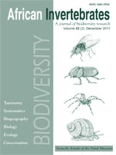
AFRICAN INVERTEBRATES
Pioneering Insights into Africa's Unique FaunaAFRICAN INVERTEBRATES is a distinguished open-access academic journal published by the COUNCIL NATAL MUSEUM, specializing in the study of invertebrate biology within the vibrant ecosystems of Africa. Operating since 2006, this journal has established itself as a vital resource in the fields of Animal Science, Ecology, Evolution, Behavior, Insect Science, and Paleontology, earning a strong Q2 ranking in these categories as of 2023. With its ISSN 1681-5556 and E-ISSN 2305-2562, the journal provides unrestricted access to cutting-edge research, fostering collaboration among global researchers and professionals. AFRICAN INVERTEBRATES serves not only as a platform for high-quality scholarly articles but also aims to enhance the understanding of Africa's unique invertebrate fauna and the ecological challenges they face. With a commitment to innovation and excellence, the journal is pivotal for those looking to contribute to the discourse surrounding African biodiversity and conservation strategies.
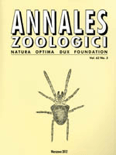
ANNALES ZOOLOGICI
Unveiling the Mysteries of Ecology and EvolutionANNALES ZOOLOGICI is a distinguished academic journal published by the Museum & Institute of Zoology, Polish Academy of Sciences, based in Warsaw, Poland. With a long-standing tradition in zoological research, this journal has evolved to encompass a diverse range of studies in ecology, evolution, behavior, and systematics, aiming to foster a deeper understanding of animal biology and conservation. It holds a commendable Q2 classification in the 2023 Ecology, Evolution, Behavior and Systematics category, indicating its significant contribution to the field. Although ANNALES ZOOLOGICI is not an open-access publication, it remains accessible to a global audience of researchers, professionals, and students aiming to advance their knowledge and engage with cutting-edge zoological findings. As of 2024, this journal continues to be a vital resource for those eager to explore the complexities of animal life and contribute to ongoing discussions within this essential scientific discipline.

REVISTA CHILENA DE HISTORIA NATURAL
Cultivating Understanding of Our Natural WorldREVISTA CHILENA DE HISTORIA NATURAL, published by the SOCIETAD BIOLOGIA CHILE, is an esteemed open-access journal dedicated to the fields of Agricultural and Biological Sciences as well as Environmental Science. With an ISSN of 0716-078X and an E-ISSN of 0717-6317, the journal has maintained an impactful presence since its inception in 2000, offering unrestricted access to vital research that influences the biodiversity and ecological initiatives in the region and beyond. Positioned in the Q2 quartile for Agricultural and Biological Sciences and Q3 for Environmental Science as of 2023, REVISTA CHILENA DE HISTORIA NATURAL exemplifies its commitment to high-quality and influential research, evidenced by its respectable ranking in Scopus—89th percentile for Agricultural and Biological Sciences and 131st in Environmental Science. Operated out of Santiago, Chile, and covering a wide range of topics with a converging publication timeline from 2002 to 2024, this journal serves as a crucial resource for researchers, professionals, and students looking to deepen their understanding of natural history and its implications for future ecological preservation.
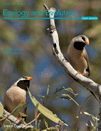
Ecology and Evolution
Bridging knowledge gaps in ecology and evolution.Ecology and Evolution is a leading open-access journal published by WILEY, dedicated to advancing knowledge in the fields of ecology, evolution, and behavior. Since its inception in 2011, the journal has established itself as a critical platform, garnering a significant impact factor and maintaining a prestigious Q1 ranking in multiple categories, including Ecology, Evolution, Behavior and Systematics, and Nature and Landscape Conservation as of 2023. With its continuous commitment to high-quality research, Ecology and Evolution provides a vital conduit for dissemination among researchers, professionals, and students alike. The journal's open-access model ensures that groundbreaking findings are accessible to a global audience, fostering collaboration and innovation across various ecological and evolutionary disciplines. The editorial team invites submissions that explore the intricate relationships between organisms and their environments, aiming to inspire future research that addresses pressing environmental challenges. The journal's rigorous peer-review process guarantees the integrity and quality of published work, reinforcing its position as a frontrunner in its field.

ORGANISMS DIVERSITY & EVOLUTION
Illuminating Biodiversity: Where Research Meets ConservationOrganisms Diversity & Evolution is a premier academic journal published by Springer Heidelberg, dedicated to advancing the fields of ecology, evolution, behavior, and systematics. Established in 2001 and continuing through 2024, this journal plays a crucial role in disseminating high-quality research that explores the complexities of biological diversity and evolutionary processes. With a commendable 2023 Scopus ranking of #253/721 in its category, placing it in the 64th percentile, and categorized in the Q2 quartile for Ecology and Evolution, it consistently attracts contributions from leading scientists and researchers worldwide. Although it operates on a subscription basis, the journal's rigorous peer-review process and dedication to impactful scientific discourse make it an invaluable resource for academics, practitioners, and students keen on understanding the intricate relationships that shape our biodiversity. By highlighting innovative research and fostering discussions on urgent ecological challenges, Organisms Diversity & Evolution serves as a vital platform for those committed to conservation and evolutionary biology.

NOVITATES CARIBAEA
Unveiling the Secrets of Caribbean EcosystemsNOVITATES CARIBAEA is a distinguished academic journal dedicated to the exploration of Caribbean natural history, fostering a deep understanding of the region's biodiversity and ecological significance. Published by the MUSEO NACIONAL HISTORIA NATURAL-SANTO DOMINGO, this open-access journal has been a platform for scholarly communication since 2009, aiming to provide unrestricted access to high-quality research outputs. With its commitment to promoting research in Caribbean ecosystems, NOVITATES CARIBAEA plays a crucial role in the academic community, facilitating knowledge exchange among researchers, professionals, and students. The journal welcomes submissions exploring various aspects of natural history, including taxonomy, conservation biology, and ecological studies, making it an essential resource for those dedicated to understanding and preserving the unique environments of the Caribbean.
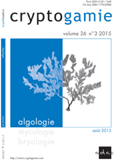
CRYPTOGAMIE ALGOLOGIE
Fostering Insights into Evolutionary Adaptations of CryptogamsCRYPTOGAMIE ALGOLOGIE, with ISSN 0181-1568 and E-ISSN 1776-0984, is a prominent scholarly journal published by ADAC-CRYPTOGAMIE in France, focusing on the intricate intersection of aquatic sciences, ecology, evolution, and plant sciences. Established in 1990, this journal serves as a vital platform for researchers, professionals, and students alike, fostering the dissemination of innovative research and comprehensive reviews in its field. With a Q3 ranking in Aquatic Science, Ecology, Evolution, Behavior and Systematics, and Plant Science for 2023, CRYPTOGAMIE ALGOLOGIE stands out for its contributions to understanding cryptogams' ecological significance and their evolutionary adaptations. The journal is indexed in Scopus, reflecting its impact and relevance in the scientific community, with particular strengths highlighted by ranks in various categories. As an engaging resource for those involved in aquatic ecosystems and plant ecology, CRYPTOGAMIE ALGOLOGIE invites submissions that push the boundaries of knowledge in these crucial fields, ensuring methodologies and findings are accessible and impactful for future research.

REVUE SUISSE DE ZOOLOGIE
Connecting Ecology, Evolution, and BehaviorThe REVUE SUISSE DE ZOOLOGIE, published by the esteemed MUSEUM HISTOIRE NATURELLE, is a premier journal dedicated to advancing the field of zoology and its related disciplines. Established in 1964, this Swiss journal has consistently provided a platform for high-quality research in the areas of ecology, evolution, behavior, and systematics, currently holding a commendable Q3 ranking in these categories for 2023. With a rich publication history spanning from 1964 to 1979 and then from 1994 to the present, it serves not only as a significant repository of knowledge but also as a crucial resource for researchers, professionals, and students alike. While the journal is not open access, it remains a vital tool for those wishing to stay at the forefront of zoological research and innovation. Its commitment to disseminating groundbreaking studies makes it an indispensable asset for academic institutions and researchers globally, ensuring that pivotal findings in zoology continue to gain visibility and impact.
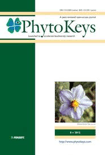
PhytoKeys
Empowering research in ecology and evolution.PhytoKeys is a prominent open-access journal published by PENSOFT PUBLISHERS that has become a vital resource in the fields of Agricultural and Biological Sciences, Ecology, Evolution, Behavior and Systematics, and Plant Science. Since its inception in 2010, PhytoKeys has provided a platform for researchers and scholars to disseminate high-quality botanical research, making it increasingly relevant globally. The journal enjoys a commendable impact factor reflected in its 2023 ranking, positioning it in the Q2 quartile across multiple categories, including the 61st percentile in Agricultural and Biological Sciences (miscellaneous) and the 53rd percentile in Plant Science. With a dedicated editorial board and a mission to advance our understanding of plant diversity, taxonomy, and conservation, PhytoKeys supports the academic community by facilitating accessibility to cutting-edge research. Its commitment to open access ensures that valuable knowledge is readily available to researchers, professionals, and students worldwide, fostering collaboration and innovation in plant sciences.

RECORDS OF THE AUSTRALIAN MUSEUM
Unveiling Insights from Australia’s Rich BiodiversityRecords of the Australian Museum is a leading journal in the fields of Animal Science, Ecology, History, and Museology, published by the renowned Australian Museum in Sydney, Australia. With a commitment to advancing knowledge and understanding of natural history and cultural heritage, this journal provides an essential platform for original research, reviews, and significant findings relevant to its diverse academic audience. The journal encompasses a broad scope, including studies in ecology, evolution, behavior, systematics, and the history of science, attracting contributions from leading scholars and professionals. Notably, it ranks highly in various categories, achieving a Q1 ranking in History and Museology, reflecting its impact and prestige within the academic community. Although it operates under a traditional access model, the journal ensures that its robust compilation of cutting-edge research remains vital to researchers, professionals, and students aiming to stay informed of the latest developments in their fields. With converging years of publication since 1983, Records of the Australian Museum continues to play a pivotal role in disseminating critical insights and fostering discussions that shape our understanding of both the natural world and our cultural heritage.